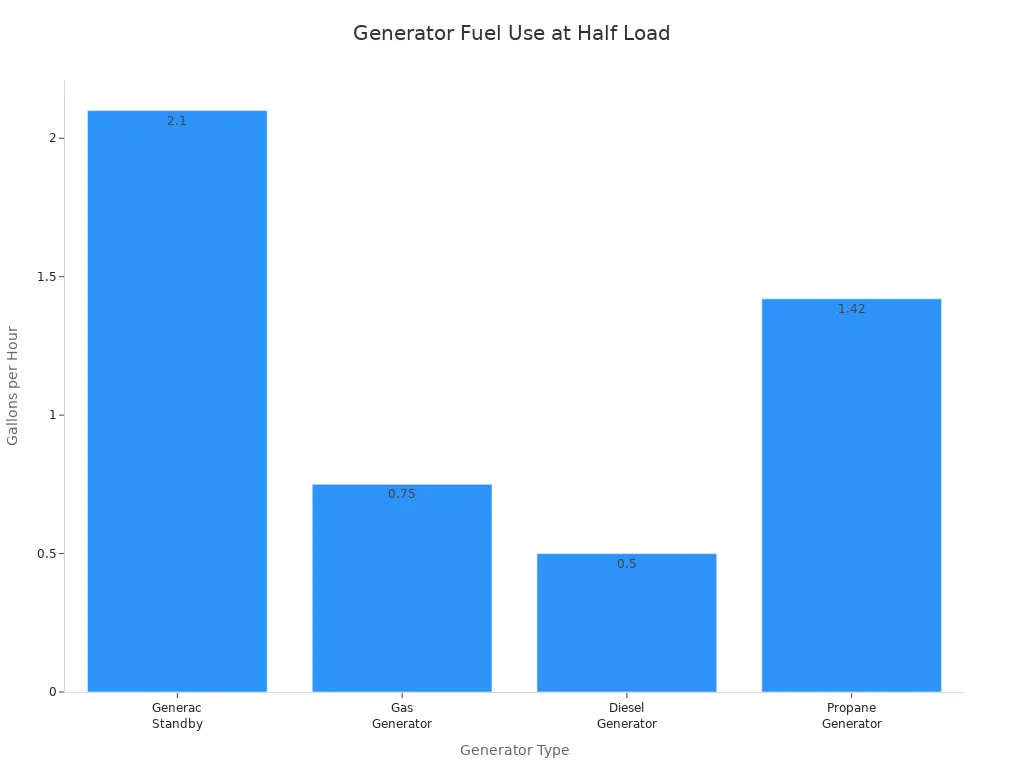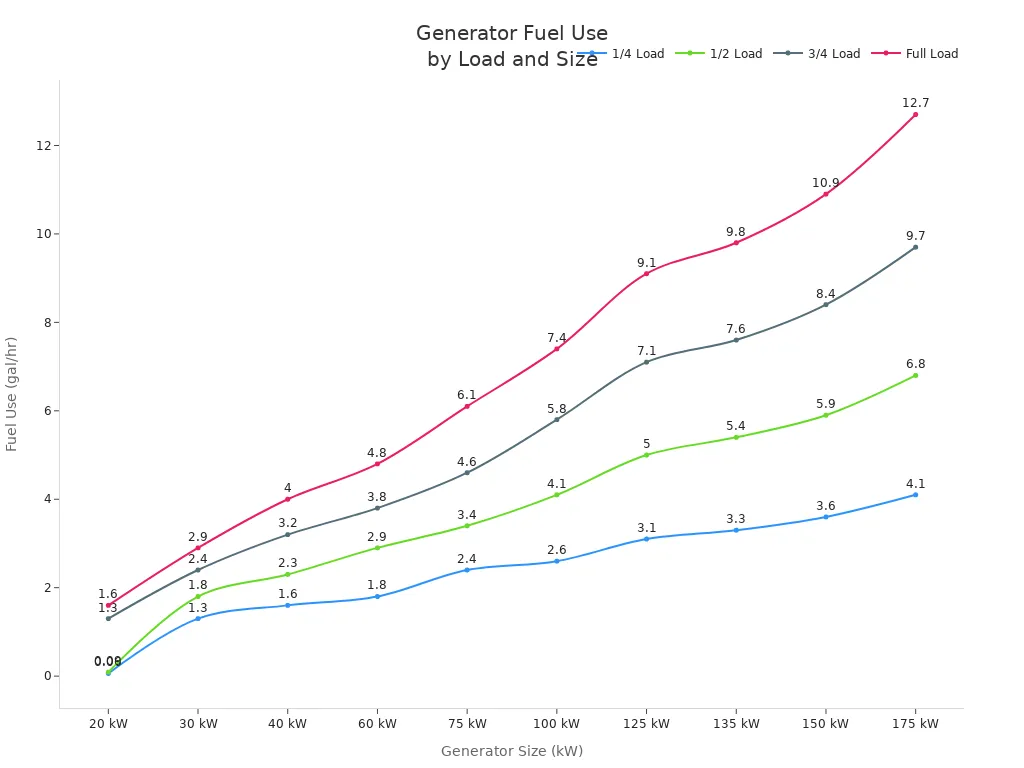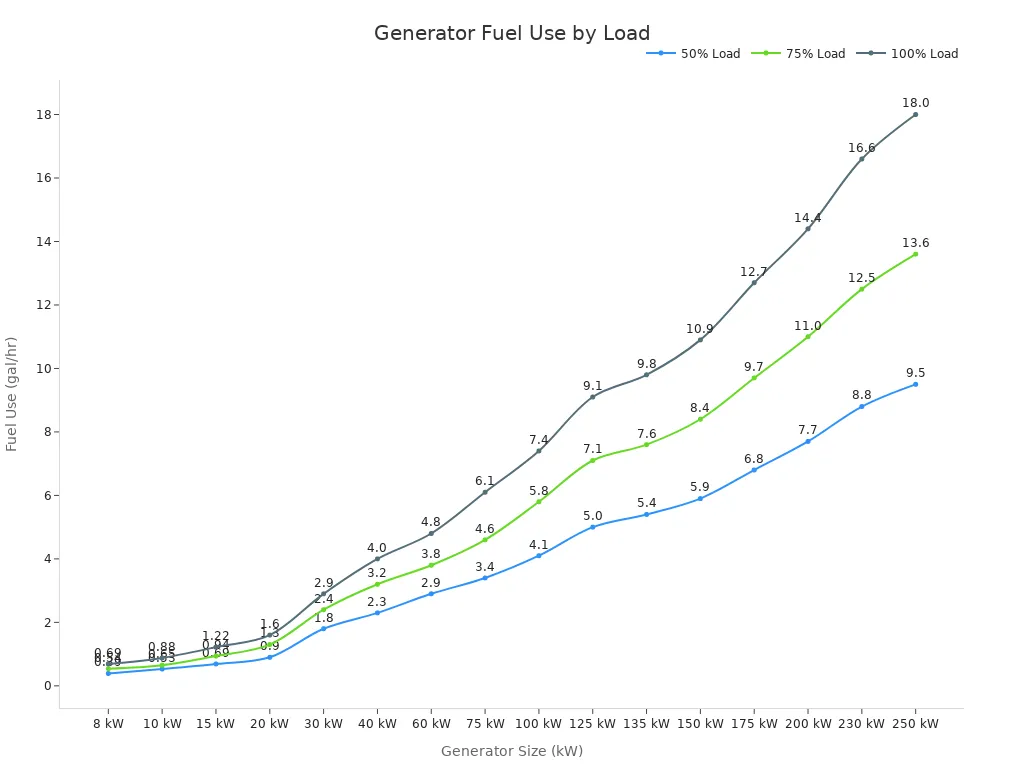Newtec Power Equipment Co., Ltd.
English

Views: 0 Author: Site Editor Publish Time: 2025-11-18 Origin: Site
You may ask how much gas a generator uses when you need backup power. A 7,500-watt portable generator uses about 0.35 to 1.2 gallons of gas each hour. The amount depends on how much power you use. Diesel generators, like a 5 kW model, use 0.25 to 0.5 gallons every hour. A Gas Generator that uses natural gas needs between 90 and 200 cubic feet each hour. The amount changes with the generator size, type, and power needed. The table below shows common fuel use rates:
Generator Type | Load (%) | Fuel Consumption (gal/hr or cfh) |
|---|---|---|
7,500 W Portable | 25 | 0.35-0.45 |
7,500 W Portable | 50 | 0.55-0.7 |
7,500 W Portable | 75 | 0.8-0.9 |
7,500 W Portable | 100 | 1.0-1.2 |
Diesel Generator (5 kW) | 25 | 0.25 |
Diesel Generator (5 kW) | 50 | 0.35 |
Diesel Generator (5 kW) | 75 | 0.5 |
Natural Gas Generator | 50 | 90-140 cfh |
Natural Gas Generator | 100 | 120-200 cfh |
You can use these numbers to see how much gas your generator will use. Simple examples and easy math can help you guess how much fuel your generator needs and what it may cost.
How much fuel a generator uses depends on its size and power. A 7,500-watt portable generator uses 0.35 to 1.2 gallons of gas each hour.
Using only the devices you need helps save fuel. If you run the generator at lower power, it uses much less fuel.
Diesel generators use less fuel than gasoline generators. They can run longer with less fuel. This makes them a good choice for backup power.
Taking care of your generator helps it work better. Clean filters and the right amount of oil help it use less fuel and last longer.
Knowing how much fuel your generator uses helps you get ready for emergencies. If you know its fuel use, you can plan and manage costs better.
You might ask how much fuel a portable generator uses. The amount depends on the generator’s size and how much power you use. If you plug in more things, the generator uses more fuel. The table below shows how much fuel different portable generators use at different power levels:
Generator Size | Load Percentage | Fuel Consumption (gal/hr) |
|---|---|---|
2,000 W inverter | 25% | ~0.1 |
50% | ~0.18 | |
3,500-4,000 W mid-size | 25% | ~0.2 |
50% | ~0.35-0.4 | |
6,500-7,500 W worksite | 25% | ~0.35-0.45 |
50% | ~0.55-0.7 | |
75% | ~0.8-0.9 |
If you use a 2,000-watt generator at half power, it uses about 0.18 gallons of gas each hour. You can figure out how much fuel you need for a day or night. Knowing how much fuel your generator uses helps you get ready for emergencies or camping trips.
Tip: Use only the devices you need. Keep the generator’s power below the highest level to save fuel.
Standby generators turn on by themselves when the power goes out. You might wonder how much fuel they use. The amount depends on the generator type, what fuel it uses, and how much power you need. Here are some examples of how much fuel standby generators use:
A 5 kW gas generator uses about 0.75 gallons each hour.
An 8 kW diesel generator uses about 0.5 gallons each hour.
A 6 kW propane generator uses about 1.42 gallons each hour.
A 7 kW natural gas generator uses about 118 cubic feet of gas each hour.
You can see that different generators use different amounts of fuel. The table below compares some standby generators at half and full power:
Generator Type | Power (kW) | Fuel Type | Consumption at Half Load (gallons/hour) | Consumption at Full Load (gallons/hour) |
|---|---|---|---|---|
Generac Standby | 22 | Propane | 2.1 | 3.6 |
Gas Generator | 5 | Gasoline | 0.75 | N/A |
Diesel Generator | 8 | Diesel | 0.5 | N/A |
Propane Generator | 6 | Propane | 1.42 | N/A |
Natural Gas Generator | 7 | Natural Gas | N/A | 118 cubic feet/hour |

Note: Generators use less fuel when you use less power. If you use too much power, the generator uses more fuel. Pick a generator that fits your needs.
You might want to know how diesel and gas generators compare. Diesel generators use less fuel and work well for a long time. They use special parts that help them get more energy from each gallon of fuel. Small diesel generators can run for hours without using too much fuel.
Diesel generators use less fuel than gas generators for the same power.
Natural gas generators use more fuel than diesel generators.
A 10kW diesel generator can turn about 40% of its fuel into electricity. Gas and natural gas generators usually turn less fuel into electricity.
If you want backup power and want to save money on fuel, diesel generators are a good choice. Gas generators are flexible and make less pollution, so people use them at home and work.
Newtec Power Equipment Co., Ltd. makes many gas generators for backup and main power. You can see their gas generator products at Newtec Power Gas Generator. Their generators work well and help you use fuel wisely.
Picking the right generator and size helps you save fuel and money. Always check the maker’s guide for the right fuel use numbers.
How much power you use changes fuel use a lot. If you plug in more things, the generator works harder. This means it uses more energy. Running your generator at half load uses less fuel than full load. For example, a natural gas generator uses about 225 to 250 cubic feet per hour at 50% load. At 75% load, it needs 320 to 350 cubic feet per hour. At full power, it can use 400 to 425 cubic feet per hour.
Load Level | Natural Gas Consumption (cfh) |
|---|---|
50% | 225-250 |
75% | 320-350 |
100% | 400-425 |
If you want to save energy, use only what you need. Turn off extra devices to help your generator last longer and cost less.
Generator efficiency shows how well fuel turns into electricity. Newer generators often have better technology. This helps them use less fuel for the same power. If you take care of your generator, it works better and wastes less energy. Inverter generators change their output to match what you need, so they use fuel smartly.
Fuel use changes with load, efficiency, and engine size.
A small diesel generator (10 kVA) uses about 2–3 liters per hour at full power.
A medium generator (100 kVA) needs 20–25 liters per hour at full power.
A large generator (500 kVA) can use 100 liters per hour at full power.
One liter of diesel can make 3 to 4 kWh of electricity, depending on efficiency.
High fuel use happens when the load is high, the engine is old, or the generator is not the right size.
Doing regular maintenance and picking the right size helps you get the most power from your generator.
The kind of fuel you use changes how your generator works and how much energy it uses. Diesel fuel has a lot of energy, so diesel generators often use less fuel and last longer. Natural gas burns cleaner and makes less pollution, so it is better for the environment. Biofuels come from renewable sources and help cut down pollution, but they may not give as much energy.
Fuel Type | Advantages | Disadvantages |
|---|---|---|
Diesel | Higher fuel efficiency, durability, low maintenance | Higher upfront cost, emissions concerns |
Natural Gas | Cleaner combustion, lower emissions | Requires infrastructure, lower energy density |
Biofuels | Eco-friendly, renewable resources | Lower energy density, higher production costs |
Tip: Choose a fuel type that fits your needs for power, cost, and the environment. New generators use better designs to save fuel and make less pollution.
Here are some average fuel use numbers for common home generators:
A 22 kW generator uses about 2.1 gallons per hour at half power and 3.6 gallons per hour at full power.
A 38 kW generator uses about 3 gallons per hour at half power and 5.4 gallons per hour at full power.
A 5 kW gasoline generator uses 0.75 to 0.8 gallons per hour.
An 8 kW diesel generator uses 0.5 to 0.6 gallons per hour.
A 5-6 kW propane generator uses 1.4 to 1.5 gallons per hour.
A 7 kW natural gas generator uses about 115 to 118 cubic feet per hour.
You can use a simple math formula to figure out fuel use for your home generator:
For diesel or propane generators:
Fuel Consumption (gallons/hour) = Generator Output (kW) × Fuel Consumption Rate per kW
For natural gas generators:
Fuel Consumption (cubic feet/hour) = Generator Output (kW) × Fuel Consumption Rate per kW
Here is a table to help you guess fuel use based on generator size and power level:
Generator Size (kW) | 1/4 Load (gal/hr) | 1/2 Load (gal/hr) | 3/4 Load (gal/hr) | Full Load (gal/hr) |
|---|---|---|---|---|
20 | 0.06 | 0.09 | 1.3 | 1.6 |
30 | 1.3 | 1.8 | 2.4 | 2.9 |
40 | 1.6 | 2.3 | 3.2 | 4 |
60 | 1.8 | 2.9 | 3.8 | 4.8 |
75 | 2.4 | 3.4 | 4.6 | 6.1 |
Tip: Always look at your generator’s manual for the exact fuel use. Using the right numbers helps you get ready for emergencies and keeps you from running out of fuel.

You may wonder how long 1 gallon of gas will run a generator. The answer depends on a few things:
Fuel type: Gasoline, diesel, propane, or natural gas
Load level: Using more power uses fuel faster
Generator capacity: Bigger generators use more fuel
Fuel tank size: Bigger tanks let you run longer
Usage patterns: Using more appliances uses more fuel
Engine efficiency: Good engines get more power from each gallon
Environmental conditions: Temperature and height can change how long fuel lasts
For example, if your home generator uses 0.8 gallons per hour at half power, 1 gallon will last about 1 hour and 15 minutes. If you use the generator at full power and it burns 1.6 gallons per hour, 1 gallon will last about 37 minutes.
Here is a quick table:
Generator Size (kW) | Fuel Use at Half Load (gal/hr) | Runtime per Gallon (minutes) |
|---|---|---|
8 | 0.39 | 154 |
10 | 0.53 | 113 |
15 | 0.69 | 87 |
20 | 0.90 | 67 |
30 | 1.80 | 33 |
40 | 2.30 | 26 |
Note: To make your fuel last longer, only run the things you need. Turn off extra devices and try to keep your generator at a lower power level.
You can use a simple calculator to guess how much fuel your home generator will use. This helps you plan for fuel costs and not waste fuel. Here’s what you do:
Find your generator’s output in kilowatts (kW).
Check the fuel use rate per kW in your manual or use average numbers.
Multiply the output by the rate to get gallons per hour.
Multiply gallons per hour by the number of hours you want to run the generator.
For example:
You have a 20 kW diesel generator.
The average rate is 0.08 gallons per kW per hour.
20 kW × 0.08 = 1.6 gallons per hour.
If you run it for 5 hours: 1.6 × 5 = 8 gallons.
Here is a table showing how different parts of a fuel calculator help you:
Feature | Description |
|---|---|
Prevent Waste | Helps you pick the right generator size and not spend too much on fuel. |
Avoid Overloading | Makes sure your generator gives enough power and does not get overloaded. |
Maintain Fuel Efficiency | Guesses fuel needs based on power level for better fuel use. |
Budget More Accurately | Figures out total fuel costs using local prices. |
Tailored Solutions | Looks at your special power needs and how you use your generator. |
Enhancing Equipment Longevity | Keeps your generator running safely so it lasts longer. |
Streamlined Comparison | Lets you compare different generator models easily. |
Improved Safety | Helps you know backup power for important things and lowers safety risks. |
Tip: Use a fuel calculator before you buy a home generator. This helps you pick the right size and plan for fuel costs.

You can save fuel by doing these things:
Pick a generator that fits your power needs.
Run your generator at lower power when you can.
Take care of your generator so it works better.
Watch your fuel use and change how you use power.
A home generator helps you feel safe when the power goes out. Knowing how much fuel it uses helps you get ready and save money.
You might wonder how much it costs to run a gas generator for one hour. The cost depends on how much fuel your generator uses and the price of gas. Most gasoline generators use about 0.75 gallons every hour. If gas costs $3.50 for each gallon, you will pay about $2.63 per hour to run your generator. This price can change if gas prices go up or down.
Gasoline generators use about 0.75 gallons each hour.
Gas costs $3.50 for one gallon.
It costs $2.63 to run the generator for an hour.
Tip: Always check local gas prices before using your generator. This helps you plan for emergencies or long power outages.
Different fuels cost different amounts and work in different ways. Diesel generators use less fuel because diesel has more energy in each gallon. Propane burns cleaner but needs more fuel to make the same amount of power. Here is a simple table to help you compare:
Fuel Type | Energy per Gallon (kWh) | Cost per kWh | Efficiency | Typical Lifespan (hours) |
|---|---|---|---|---|
Diesel | 33 | $0.073 | High | 20,000+ |
Propane | 27 | $0.088 | Medium | 12,000–15,000 |
Gasoline | 33 | $0.080 | Medium | 8,000–10,000 |
Diesel generators cost more to buy, but they last longer and need less fixing. Gasoline generators are cheaper to buy, but they use more fuel and need more care. Propane generators are in the middle. They burn cleaner and are easier to store.
Diesel uses less fuel and runs longer.
Propane needs more fuel for the same power.
Gasoline is cheaper to buy but costs more over time.
You can save money on generator fuel by doing a few smart things:
Use your generator when electricity is most expensive.
Only power big appliances, not your whole house.
Use solar panels with your generator for backup power.
Make sure your generator is the right size for what you need.
Keep your generator in good shape with oil changes and clean filters.
Watch your fuel levels so you do not run out or waste fuel.
Find out when energy costs the most and use your generator at the best times.
Keeping your generator clean and well-maintained helps it use less fuel. Clean filters and new oil help your generator work better and save you money.
You now know how fuel use and cost matter for your home. Look at the tables and tips to guess your generator’s fuel use. Doing regular checks and watching your generator helps you save fuel. Always read the maker’s guide for the right numbers. Store fuel in a safe place and pick the best type for your generator. Check your generator often to keep it working well. Good planning helps your home stay powered and saves money.
Tip | Description |
|---|---|
Regular Maintenance | Helps your generator work well and not break. |
Use High-Quality Fuel | Stops problems and makes your generator run better. |
Optimize Conditions | Put your generator where air can move for best results. |
Making smart choices helps your generator last longer and saves money.
To find fuel use, check the generator’s output in kilowatts. Multiply this number by the fuel rate for each kW. You should look in your manual for the exact numbers. This helps you know how much fuel you will need.
Your generator uses more fuel when you plug in more things. The size and efficiency of your generator also matter. The type of fuel changes how much you use. Doing regular maintenance helps your generator use less fuel.
A small generator can run for one or two hours with one gallon. Bigger generators use fuel faster than small ones. Always check your manual to see the exact runtime.
Diesel generators use less fuel for the same amount of power. You save more fuel with diesel, especially if you use it for a long time. Gas generators are easier to use at home and make less pollution.